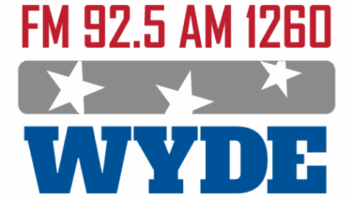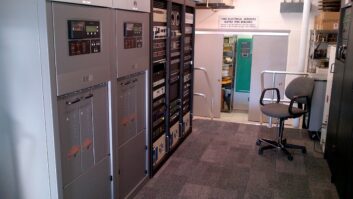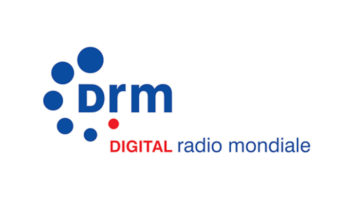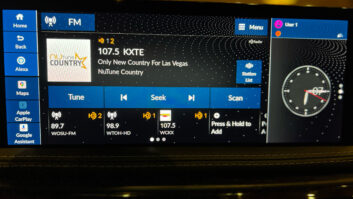By some accounts, the auction held in the spacious Los Angeles facilities of the moribund Internet radio venture known as ComedyWorld.com exceeded expectations.
When the business, now in Chapter 7 bankruptcy proceedings, closed down last spring, managers locked the doors behind them. Employees found themselves waiting for weeks to retrieve personal belongings and, in some cases, a final paycheck, while every last bit of equipment was accounted for.
“We wanted to secure our assets that were there so we wouldn’t be plundered and that there would be a maximum amount of cash to pay the employees,” said former Comedyworld.com Director of Engineering Barry Thomas. He is now chief technology officer at StratosAudio, Inc., a company that provides interactive technology company for conventional radio broadcasters.
While most bankruptcy auctions can only expect to get a modest percentage of the original value of the equipment being sold off, the Aug. 20 event was rather successful.
Over the 10-and-a-half-hour period, more than 250 registered bidders from Citadel, Premiere Radio Networks, Infinity, Trinity, the Victor Group, individuals, reps from smaller companies and dealers bid on items from 1,850 lots.
They bid on rows of file cabinets, scores of microphones, 150 PCs, 10 MACs, server equipment, seven Digidesign Pro Tools systems, four audio edit studios, three multitrack audio production studios, a radio network distribution center, at least 40 sets of headphones, video equipment, a box of Comedyworld.com posters, even a baby’s crib.
The roughly $3.5 million worth of relatively new equipment sold for an estimated $550,000.
Never lulled
“Bidding was competitive,” said auctioneer Ray Bleau. “At times it was frenzied. The broadcast and video equipment had heavy participation. There were never any lackluster periods and the crowd remained throughout the sale.”
By the end of the day, everything had been sold off.
“The turnout was pretty hot,” said Thomas. “We did better than the low-end estimate and a little less than the high-end.”
The Pro Tools 001 systems, originally $7,500, went for roughly $3,000. Infinity picked up most of a $200,000 automation system for $45,000. The system included a confidence monitor that mimicked a local affiliate, allowing Comedyworld.com engineers to verify whether a programming element had played, making troubleshooting a breeze.
A $10,000 reception console reportedly went for $50. Such was the ignominious end for an idea that six months before had appeared to have tremendous potential.
Poised for growth, 20 audio and video studios had been placed inside trailers housed within a 50,000-square-foot warehouse in the Marina Del Rey area of Los Angeles.
The long-term plan, according to Thomas, was to move everyone into an adjoining building, remove the trailers and convert the remaining space into a parking garage for the 70-plus Los Angeles employees (another 40 worked on the Web site in San Francisco).
While Internet venture money made Comedyworld.com possible to begin with, it also created problems later. Initially flush with cash to build up the infrastructure, the company also spent like a broadcast station.
Its business model, however, appeared to be a hybrid: part Internet portal and part fledgling radio network.
“The idea was to build the value of the Web site using the radio shows and the talent connected to them,” said Thomas.
Jay Clark, now program director for WRKO(AM) in Boston, joined the venture somewhat reluctantly.
“I laughed at the idea at first,” said Clark. “But then I met with the backers in New York. They were comfortable with the Internet, but hadn’t done a lot of broadcasting.”
Clark’s success with FM talk stations in Orlando, Fla., and Los Angeles – stations that had a strong comedic component – led to his role at Comedy World.
Initially he was hired to develop the content for a terrestrial radio network that was intended to coexist with an Internet portal containing a strong video component.
“The project started early on as a radio project,” Clark said. “The original investors wanted to start a radio network, but they found the that the money was more easily obtained for an Internet venture.
“The backers expected us to be run like an Internet company. We had this Internet division spending like an Internet company,” said Clark.
Clark estimates that the company was spending at the rate of $8 million a year.
“It was a lot of money. We spent like a major-market radio station, but we put out a terrific product.”
Through a partnership with Citadel, Comedyworld.com was able to work with 19 affiliates, four taking the network feed full-time.
Clark went to work training comedians to do radio shows, complete with writers, board ops, producers and screeners. The Internet identity associated with the network bestowed upon the venture a certain cachet not only with investors, but also with its fiercely loyal employees who were just as enamored of Comedy World’s cutting-edge image.
Thomas, who has extensive experience as a radio engineer, said the perception that Comedy World was an Internet-only entity became a problem for the company.
“The Internet had a nebulous revenue stream. When the economy slowed, we scaled back to our core business – the radio network. The Internet identity, instead of being an asset, became a liability in terms of funding and getting PDs to consider us a programming source. It made our sales guys’ jobs a lot harder.”
Testing ground
Nevertheless, Thomas said streaming audio and video content on the Internet was a wonderful tool for testing product.
“We had six months to refine a show before going on the air.”
The lineup in its final stages included hosts Ahmet Zappa, son of rock icon Frank Zappa, Allen Harvey, the Boone Brothers and “Wrestling 101” with “Big Schwag.”
“It would have taken us (another) year and a half to get to a break-even point in a normal economy. It would have been a normal radio play at that point,” Thomas said.
However by March of this year, the investors were getting nervous, although it was not evident to the enthusiastic employees.
“We were within six weeks of good Arbitrons coming in,” said Thomas, referring to affiliates in Syracuse, N.Y., Spokane, Wash., and Charleston, S.C. “And once you show traction with a radio network, it’s a whole lot easier to build an affiliate base.”
When the bottom fell out in April, after one of the investors yanked a bridge loan, the end was sudden. Clark said the board operators volunteered to stay an extra week to keep the content flowing to the affiliates until new programming could be arranged.
“These people cared,” said Clark. “As a manager, that’s all you can ask for. There was magic in those studios where people gave 110 percent. It came to be a family that would grow and we’d make money, at least that was the idea.”
For those employees, the success of the auction meant that final paycheck plus severance pay would finally arrive in the mail.







